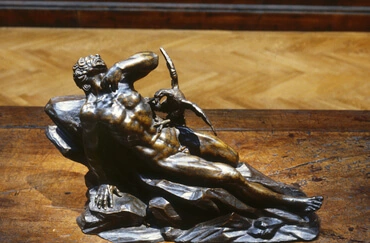The Golden Calf
By New Christian Bible Study Staff
As this story begins, the Children of Israel have escaped Egypt, and are camped near Mount Sinai. Moses, their leader, as climbed up the mountain, and is receiving the Ten Commandments from Jehovah. The people get impatient, and think that perhaps Moses will not return, and they ask his brother Aaron, the High Priest, to make them new gods.
Aaron complies - which is surprising - given that he has been involved in the Exodus since the beginning, supporting Moses. But he does, and collects golden earrings, melts them down , and fashions them into a golden idol shaped like a calf. He builds an altar before the calf, and proclaims a feast to Jehovah.
God sees what is happening, and is angry, telling Moses that he will destroy these people, and start over again, using Moses to start a new church. Moses persuades God not to do this, reminding him of the faith of Abraham, Isaac, and Jacob. Yet, as Moses descends from the mountain, carrying the Ten Commandments etched by the hand of God on two tables of stone, and sees the extent of the forbidden idolatry, he too is angry. He shatters the tables of stone, grinds the calf into dust, mixes the dust into water, and makes the people drink it.
What's the inner meaning of this story?
It's explained in detail in Arcana Coelestia, starting in section 10395. Every detail is important. Very briefly, though:
If we don't realize, or recognize, that the Word contains truths from God, we can react by "gathering to Aaron" - just being religiously observant in an external, perfunctory way.
Detached from internal worship, we gravitate to developing false ideas - idols - that we use in religious teachings and worship. Not knowing Moses's whereabouts means a total unawareness of the internal truths of the Word.
When Aaron gathers the earrings, that signifies the external church cherry-picking truths from the literal sense of the Word to support a man-made religion that reinforces what it loves.
We can think ways that churches that have done this, and on a personal level, there's a strong tendency for us to do this, too - to think shallowly, to extract things from the Word and mold them into idols, or justifications for the things we want to do.
The two tables of stone are inscribed on both sides. There are internals and externals of religion. We need both. This is the reason why the internal meaning of the Word is so important to us all; it contains the inner truths that we need to understand, and live by, and learn to love.
This is much too brief a summary to do the story justice; it's one of they key turning points in the religious history of humankind, and it has profound meaning for us as individuals, and for our churches and nations.
Cry

As with most common verbs, the spiritual meaning of “crying” or “crying out” (meaning a shout or wail, not weeping) is highly dependent on context. Who is crying out? To whom? Why? In most cases, though, crying has to do with speaking falsely, and of the emotions arising from the conflict between truth and falsity. When people cry out in distress it is most often an indication that they are being overwhelmed by false ideas. In other cases – especially regarding more joyful cries – it is a celebration of the triumph of truth.






